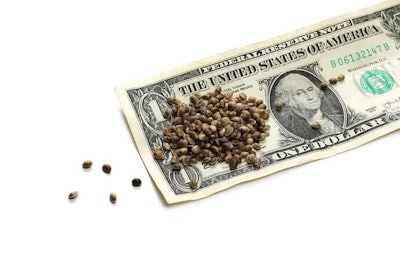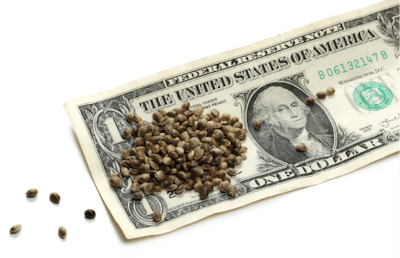

Despite hemp’s status as a federally legal industry, many banks have yet to catch up with regulations. Hemp farmers are still having trouble finding banks that will provide lending and other financial services.
“Because hemp is not yet a well-known product, it’s not easily funded by agricultural programs. And the second you’re outside of those programs, funding becomes very hard to find,” says Dan Miller, the founder and CEO of Steward, a crowdfunding platform for sustainable farms.
Those operating cannabidiol (CBD)-related businesses have it even tougher as they operate in regulatory limbo, with CBD not approved for sale by the U.S. Food and Drug Administration (FDA) and illegal to market as providing any health benefits. Several states have also deemed CBD illegal.
West Town Bank & Trust (a subsidiary of Integrated Financial Holdings Inc.) is one financial institution that has opened itself up to hemp businesses. The bank now services more than 100 hemp-related businesses, many of which are concentrated in the Southeast, though the company provides services across all 50 states.

West Town Bank & Trust (WTB) provides an array of services that include checking and savings accounts, online and mobile banking capabilities, remote deposit capture and positive pay, “an automated cash-management service used by financial institutions employed to deter check fraud,” as explained by Investopedia.com. The bank also recently launched a joint venture with payment processing experts to form West Town Payments LLC to offer brick-and-mortar and online hemp businesses a payment processing platform, which works in tandem with the bank’s commercial services. In addition, the bank has lenders who focus on providing hemp businesses with access to capital, while a partnership with West Town Insurance Agency Inc. allows the bank to offer a variety of policy types.
Here, Melissa Marsal, the executive vice president and chief operating officer of West Town Bank, discusses what hemp businesses need to know when seeking a financial institution to partner with and why banks have taken so long to catch up.
Theresa Bennett: Why do you think it’s taken so long for banks to catch up with this industry’s needs? How did WTB move so quickly?
Melissa Marsal: Taking the time to develop a comprehensive program [that] ensures these businesses are compliant is an extensive process. Additionally, I think many banks are taking a “wait and see” approach as it relates to the SAFE [Secure and Fair Enforcement] Banking Act, which is still in limbo. The act was designed to prohibit federal regulators from punishing financial institutions for the sole reason that they choose to provide … services to cannabis companies, their owners and their employees. [The National Cannabis Industry Association (NCIA) expects the SAFE Banking Act to be re-introduced to Congress in early 2021 after failing to pass multiple times since its introduction in 2019.]
This hesitation on the part of financial institutions to provide services to hemp-related businesses has led to a multi-billion-dollar industry operating largely on a cash-only basis. Our team knew we had to take an “all-in” approach with this vertical, doing our part to not further impede the industry’s growth, as there are many risks involved with not being able to properly track funds for businesses that operate solely on a cash basis.
The opportunity was really recognized for us with the passage of the 2018 Farm Bill, which identified hemp with a THC [tetrahydrocannabinol] level of 0.3% or less as no longer being a controlled substance. … We then spent the better part of 2019 figuring out federal regulations and the varying state-by-state restrictions, and built out a comprehensive, compliant program … We have trademarked our program with the motto “Hemp Banks Here” and developed an original logo to go along with the message. We are garnering accounts and building relationships in the industry on a daily basis, and it has been a very successful venture for us.
Bennett: How do your services to hemp and CBD businesses differ from your services to other businesses?
Marsal: The process in which we deliver our services is really the main differentiator. One of the considerations with the hemp industry is that it is classified as “high risk,” which is a banking term indicating a need for enhanced due-diligence and customer monitoring. Our partners at RiskScout Inc. provide an enhanced due-diligence, on-boarding and monitoring software platform for our hemp customers. With this partnership, RiskScout filters out prospective businesses through a technology-enabled application, which includes a very detailed list of questions aligned with the internal policies and procedures of our hemp compliance program. We then utilize the same technology to help manage the ongoing compliance monitoring and reporting.
That said, bundling financial solutions and products together can actually be extremely beneficial for these businesses, helping increase revenues, reduce risk and improve cash flow. For example, the powerful combination of onboarding technology, payment processing and treasury management wrapped into one offering helps eliminate compliance concerns. There have been countless horror stories with merchant service providers and settlement banks not being on the same page when it comes to accepting hemp businesses. In addition, hemp businesses can take advantage of bundled pricing options, increased financial security and having an entire team of experts that understands their business and the industry. With shared data and access to financial activity and transactions, our team can more effectively anticipate our hemp customers’ needs for additional financial service products.
On the flip side, one specific product limitation involves the lending side of things. Even in a scenario where a business has all of the appropriate COA [certificates of analysis] [and] licenses in place and follows all of the applicable state and federal guidance, there is still an inherent risk for making a loan to a hemp business. For example, default of a purchase contract by a processor and testing above legal THC limits are not insurable causes of loss under insurance programs. Furthermore, sales channels for hemp-based commodities are still new concepts for this growing industry, and the amount of product needed to meet demand remains ambiguous. Bottlenecks within hemp supply chains have led to excess supply with massive amounts of product sitting in storage, resulting in testing complications and volatile pricing for both seed and specialized equipment. Many of these situations are out of our control, so lending is typically done on a case-by-case basis.
Bennett: What should hemp-related businesses know and come prepared with when seeking a bank that will work with them?
Marsal: They should know not to feel scrutinized when a bank asks difficult questions during the onboarding process. In fact, it’s quite the opposite. Where most banks go wrong banking hemp businesses is by following a “don’t ask, don’t tell” approach. It’s a good way to get into trouble and a terrible way to partner with customers. Financial institutions are not exempt from having internal controls in place to determine the risk profile of the entity based on the nature of the business.
For their own safety, hemp businesses should ask themselves four key questions when looking for a banking partner:
- Does the bank have a dedicated team of hemp industry experts that understands the latest industry news and legislation?
- Does the bank have a compliance program in place that demonstrates a mastery of the rules and regulations?
- Is the bank carefully vetting my business by asking a series of hard questions to ensure it understands my operation? Does the bank have a solid reputation in the hemp community, and is it able to truly help grow my business by making introductions to the right people and associations?
Finding the right banking partner for a hemp business is not like walking into a branch and opening a checking account. When done right, the onboarding process will take some time, but it ultimately boils down to safeguarding the customer to avoid being kicked out of the financial institution down the road, which can be very disruptive to their operation.
















